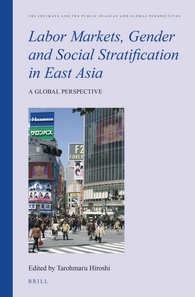Following the Asian economic crisis of the 1990s, this is the first book to examine the structure and transformation of the labor markets and social stratification of contemporary East Asia, namely Japan, Korea, Taiwan, and China, focusing in particular on gender inequality. It deals with social mobility and gender differences in unemployment, temporary employment and self-employment. Additionally, gender segregation, social identity and suicide rates are also addressed.
Taken together, the issues raised in this volume reinforce the advantage of a comparative approach to East Asian Studies. The findings, supported by strong statistical analysis, clearly call into question a longstanding view that East Asian gender regimes and class structure are homogeneous. Indeed, this is demonstrably not the case, as Labor Markets, Gender and Social Stratification in East Asia shows, revealing as it does considerable diversities in labor markets, gender regimes, and social mobility within East Asian societies due to historical and institutional differences.
Contributors include: Chang Chin-Fen, Kim Young-Mi, Oda Akiko, Phang Hanam, Sakaguchi Yusuke, Shibata Haruka, Takamatsu Rie, Takenoshita Hirohisa, Tarohmaru Hiroshi, Xie Guihua, and Yamato Reiko.
>http://www.brill.com/products/book/labor-markets-gender-and-social-stratification-east-asia
Biographical note
Readership
Table of contents
List of Figures
List of Tables1. Labor Markets, Gender, and Social Stratification in East Asia: Research Background and Framework
TAROHMARU Hiroshi
2. Gender Difference in Unemployment Risk in the Face of Globalization: Effects of Institutional Factors in the Case of Japan and Taiwan
SAKAGUCHI Yusuke
3. Economic Crisis, Labor Market Restructuring and Job Mobility in Korea: 1998-2008
PHANG Hanam
4. Impact of a changing employment system on women’s employment at the times of marriage and childbirth in Japan
YAMATO Reiko
5. Can Active Labor Market Policies Enhance the Suicide-Preventive Effect of Intimacy? A Dynamic Panel Analysis of 27 OECD Countries Including Japan and Korea, 1980 to 2007
Haruka SHIBATA
6. An Interregional Comparison of Occupational Gender Segregation in Japan
ODA Akiko, TAROHMARU Hiroshi, and YAMATO Reiko
7. Who is Successful in Stabilizing Self-Employment?: Family, Gender and Labor Market Structures
TAKENOSHITA Hirohisa
8. Where the Materialism still Matters: Status Identity in East Asia
CHANG Chin-fen, XIE Guihua, TAKAMATSU Rie, and KIM Young-MiIndex











